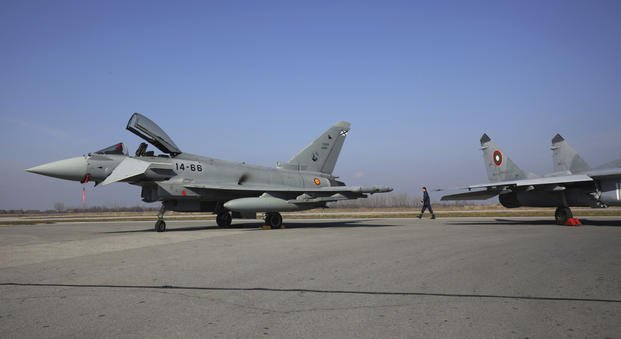Shortly after the Russian invasion began, unconfirmed rumors spread widely across the internet of a mysterious Ukrainian fighter pilot in a MiG-29 gunning down six enemy aircraft within the first hours of the war.
The unknown military hero, dubbed "The Ghost of Kyiv" on social media, had been taking to the skies since the invasion started and allegedly reached 21 confirmed Russian aircraft kills as of Wednesday, making the pilot the first supposed flying ace of the 21st century.
"The Ghost of Kyiv," however, is almost certainly a myth, albeit an incredibly useful one as Ukraine tries to rally its citizens to resist Russian conquest.
Read Next: Ukraine Wants Foreign Reinforcements. Will American Civilians Fight?
The majority of the videos and photos of a MiG-29 dogfighting shared on social media have been proven by fact checkers and researchers to be old, outdated and, in one instance, repurposed footage from a popular video game flight simulator.
Additionally, reports of a MiG-29 shooting down multiple Russian aircraft since the invasion began have not been independently verified. But that hasn't stopped the Ukrainian media, government and politicians from sharing tales of the "Ghost" online in an effort to grow morale and bolster support for the defense of their nation.
"Ghost of Kiev - MiG-29 pilot in the first 30 hours of Russian invasion into Ukraine gained 6 air victories in the sky over Kiev: hit 2 Su-35 planes, 2 Su-25 planes, 1 Su-27 and MiG-29.
The 15th flight already!!! Who is our Hero?" read a Facebook post attributed to Serhiy Borzov, who's listed as Ukraine's head of the Vinnytsia Regional State Administration.
On Feb. 25, the Ministry of Defence of Ukraine stoked the rumors by tweeting that "The Ghost of Kyiv" may be one of the reserve pilots who returned to fight after the Russian invasion.
"Dozens of experienced military pilots, from captain to general, previously released from the reserve, are returning to the Air Force," the ministry tweeted. "Who knows, maybe one of them is the pilot of the MiG-29, which is so often seen by the people of Kyiv!"
The fact that the Russians have not yet established air superiority in Ukraine is helping to keep the myth alive. A U.S. senior defense official speaking on condition of anonymity told reporters Wednesday that "Ukrainian air defenses remain operational" and that the skies are "very contested and very dynamic."
Additionally, a lack of clear information from the Russian and Ukrainian governments regarding casualties has added to the mystique of the "Ghost."
The Ukrainian Defence Ministry claimed that nearly 6,000 Russian troops and 30 aircraft had been eliminated by its forces as of Wednesday morning. Later in the day, Russia's Defence Ministry claimed 500 of its troops had died, but has not shared what aircraft have been lost.
At the moment, it seems the biggest asset "The Ghost of Kyiv" is bringing to the fight is increasing morale among Ukrainians willing to take up arms against the Russians.
Peter Singer, an American political scientist and author of "LikeWar: The Weaponization of Social Media," told Military.com that "The Ghost of Kyiv" is the latest example of how governments rely on hero narratives to inspire bravery and boost morale when they're being oppressed.
"It's a very classic human need to find and search for heroes amidst tales of horror," Singer said. "It's something the governments involved need to generate and push."
Although Russia has long been considered the master of information warfare by many security experts, Ukraine has been effectively utilizing Telegram, Twitter and Facebook to push war narratives that have been shared at unprecedented levels.
"In any information warfare, but all the more in the new social media version of it, you need to supply … a steady diet of surprises," Singer said.
Other viral tales have included the "Ukrainian Reaper" -- a soldier who was rumored to have 20 kills within the first day of the invasion -- as well as the fate of Ukrainian soldiers on Snake Island, who at first were reported to have been killed, but it was later announced had been captured.
While the stories have rallied Ukrainians and international support for their defense, it's less clear whether the myths are having an effect on Russian military forces due, in part, to major censorship by that country's government.
Emerson Brooking, a senior fellow at the Atlantic Council and coauthor with Singer on their book "LikeWar," said it's unlikely that many average residents and Russian soldiers are aware of the myths.
He added that war myths have never been taken up by a broader Western audience quite like the ones happening in Ukraine. Russian meme channels on Telegram siding with President Vladimir Putin have been taking aim at the "Ghost."
"An example that springs to mind is [the Telegram channel] did have a meme expressly making fun of The 'Ghost of Kyiv,'" Brooking said. "But the context here was 'look at the Western media, and Ukrainians inventing something because they have no hope.'"
Brooking added that many Russian citizens didn't even know about the Ukrainian invasion until last week, and that their own war myths and memes will likely kick into high gear when state media build wider support for the conflict.
In America, many online users were disappointed to find out the "Ghost of Kyiv" is likely not real. Singer added that, while the fighter pilot may not exist, one thing is true: Ukraine is holding its own in the skies.
"Does the 'Ghost of Kyiv' have the same kind of mystique that the Red Baron had in World War I when allied pilots were fearful of running into him before they even take off?" Singer asked. "I don't think we can answer that part. But have the Ukrainian air defenses fought back better than the Russians assumed? That's a definite yes."
-- Thomas Novelly can be reached at thomas.novelly@military.com. Follow him on Twitter @TomNovelly.
Related: US Says No to No-Fly Zone in Ukraine













